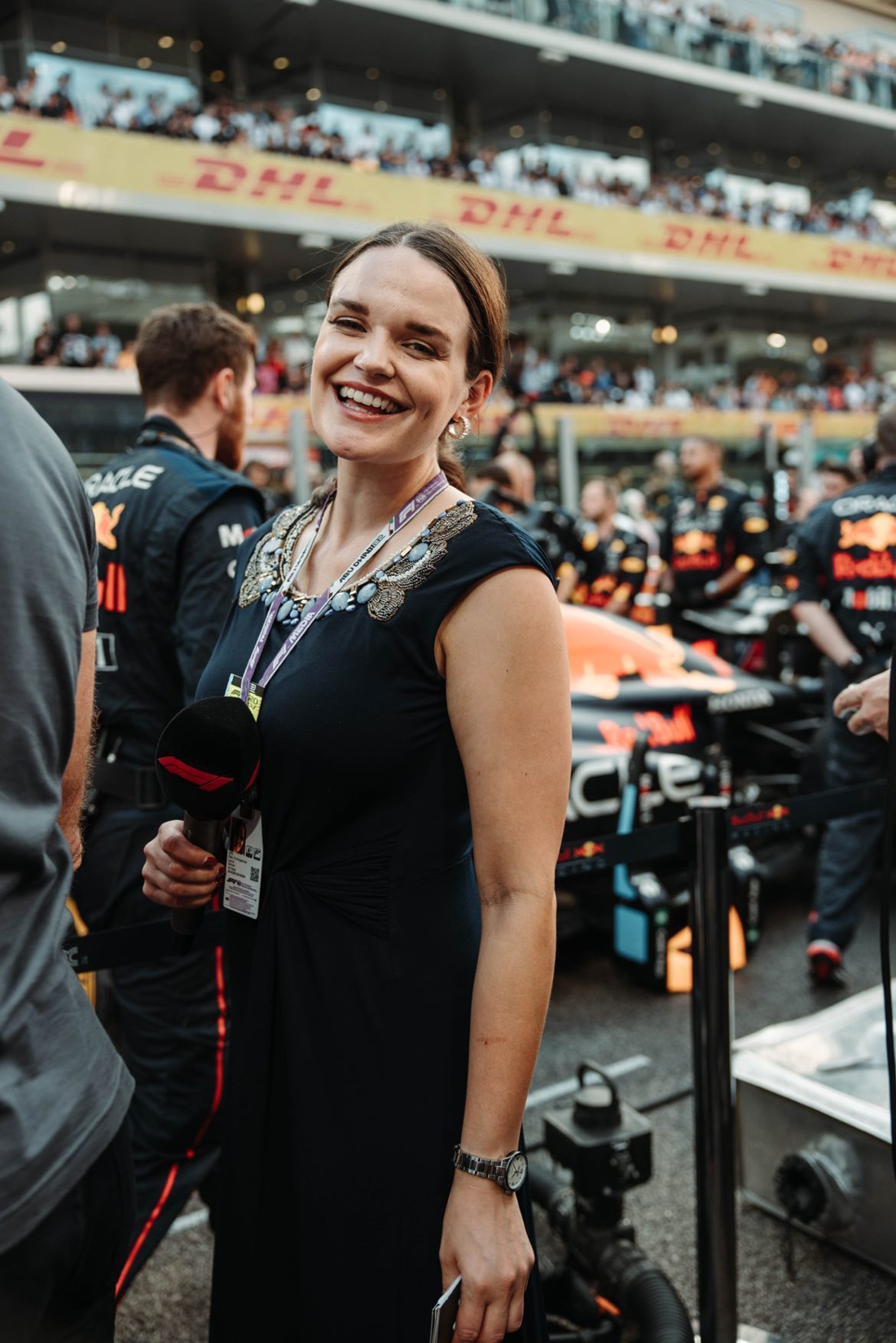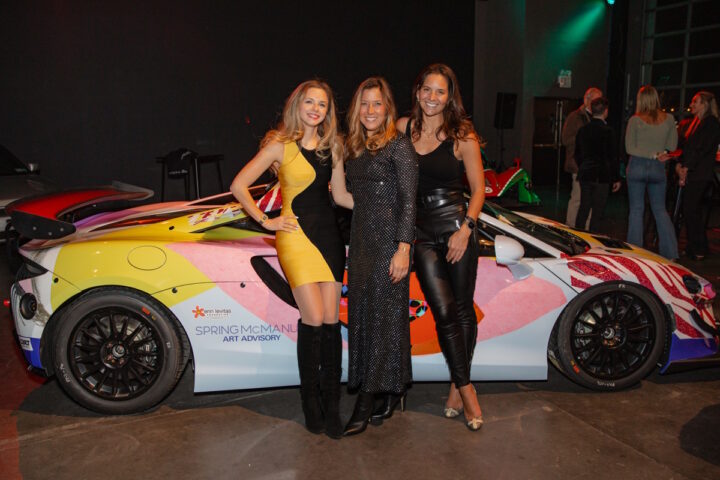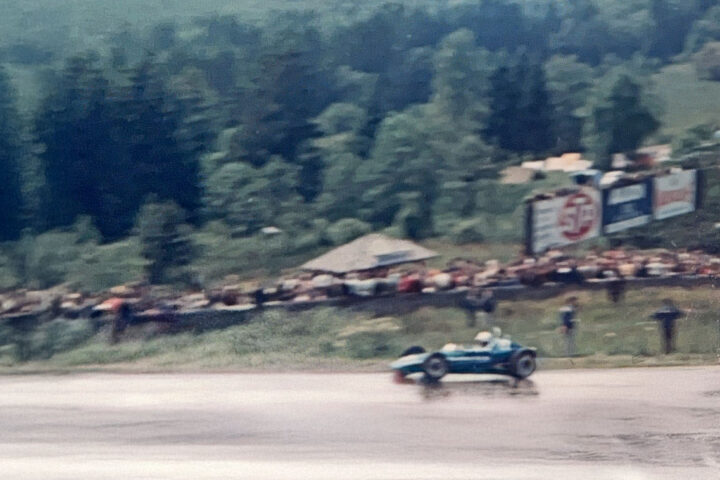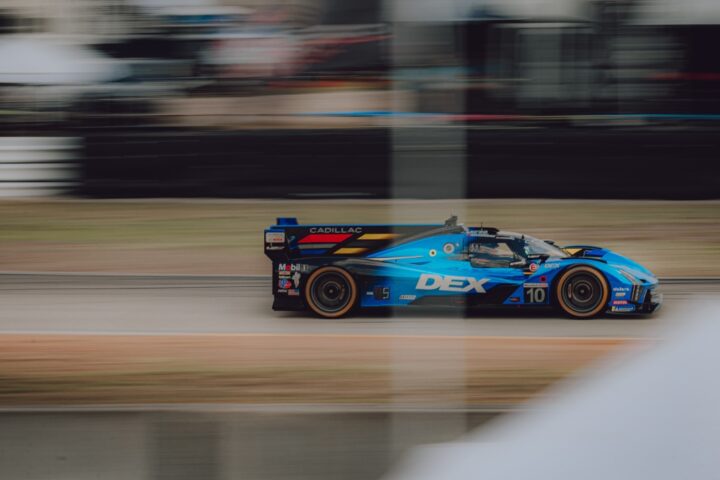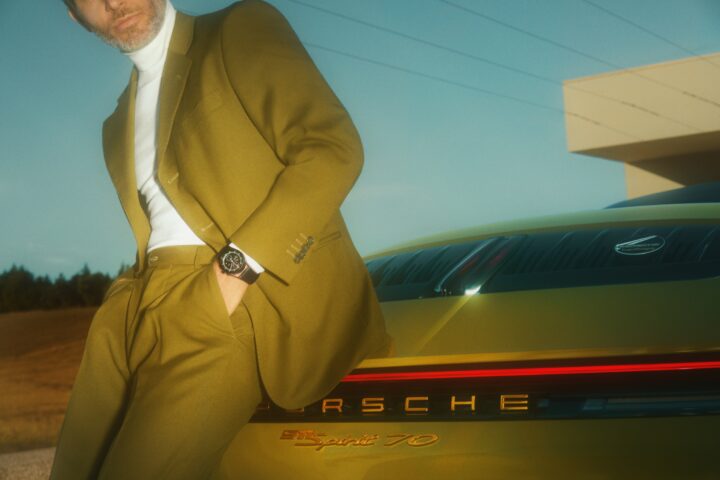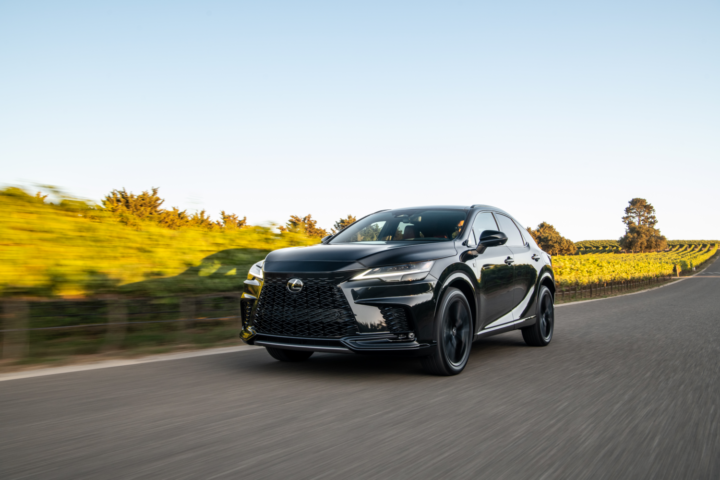by Michael Satterfield – Photos Provided by Laura Winter 07/18/2024
In a world where speed, precision, and drama meet, Laura Winter has carved out her niche with a blend of talent, tenacity, and an unmistakable passion for storytelling. As a lead presenter for F1TV, Winter’s voice and presence have become synonymous with the thrills and intricacies of Formula 1 racing. However, her journey to Formula 1 did not follow a predictable path; unlike most motorsports presenters, Laura isn’t a former racing driver, but she is an athlete with an unmatched passion for sports; we had a chance to turn the tables and interview the interviewer, about her career, Formula 1, and what’s next for one of our favorite F1 personalities.
TGR: Can you tell us a bit about
your background and how you got started in sports journalism, particularly in
motorsport?
LW: Growing up, I loved drama and theatre
studies, English, and sports; I was a competitive swimmer for 12 years,
including one year at Loughborough University, where I studied English and took
up rowing.
I also started doing student media and gained work experience in television and radio before securing my first job at the World Rowing Federation in social media and communications in Lausanne, Switzerland. I
worked there for two years, including the London 2012 Olympic Games. At just 22
years old, working at the home Games was a dream come true!
I then moved back home to the UK and started
doing work experience on the sports desk of regional newspapers. That soon
became a permanent job. It was here I secured a qualification in sports
journalism and learned many skills that underpin everything I do today. I
worked in most sports on the desk and was always interested in Olympic sports
and rugby.
After two years on the desk, I desperately
wanted to be a presenter. I went freelance in 2014 with a couple of clients and
connections in sports presentation; my first big job came at the Commonwealth
Games in Glasgow in 2014 as the netball presenter. I soon started working in
women’s cycling on a startup YouTube channel, and my portfolio and experience
grew from there. I have worked in everything from cycling, netball, swimming,
tennis, cricket, rowing, football, and rugby, but never motorsport!
In 2019, I was asked to work at the World
Rallycross Championships and then recommended to F1, who were looking for a
Track TV presenter. After navigating COVID-19, I worked my first full season in 2021 – and what a season! – and in 2023, I was asked to become the lead presenter
for F1TV.
TGR: What drew you to Formula 1
specifically, and what has kept you passionate about it?
LW: I always knew F1 was the pinnacle of
motorsport and one of the world’s most popular and greatest sports. It was not
the path I thought I’d go down, but I couldn’t be more grateful than I am now.
It has become a family; the paddock feels like home like no other sport, and
the sport is a unique blend of driver and machinery. Teams work in total
harmony and are at the very top of their game, to the millimeter and
millisecond. That relentless quest for perfection inspires and excites
me.
TGR: As a British presenter, how
do you see the evolution of F1’s popularity in the UK compared to other
regions, particularly the US?
LW: Drive to Survive and the 2021 season has
helped the most incredible boom in F1 worldwide. All sports need to grow, and
for the USA to buy into what was typically a more Euro-centric sport for a long
time is a great thing. The USA watches F1TV, so the rising numbers of fans are
evident around tracks and on social media. The rise may have been less sharp in
the UK, as there was a more established fanbase, but it has still grown. We see
more fans worldwide, including in the UK, from a more diverse background. 40%
of F1 fans are now female – that is fantastic to see. Sports must reflect the society it
serves.
TGR: What has been the most
memorable moment in your career covering F1 so far?
LW: Being in the paddock in 2021 was a privilege;
it felt like the world’s epicenter. For me, Covid had wiped an entire year of
work, and it felt at times that I could never come back from that, so working
in F1 at the climax of that season felt very sweet.
The Silverstone stage in 2022 was also a huge
success. The crowd was incredible, and it felt like Glastonbury. The drivers
were visibly moved and emotional.
When you present on F1TV and get a show right and
hit your marks, it feels like you’re flying. There have been a few Pre-Race
shows over the years, Abu Dhabi 2023, Monza 2023, and Austin
2023, which I absolutely loved. The grid is always immensely special.
TGR: How do you prepare for an
F1 race weekend in terms of research and staying updated with the latest
developments?
LW: I will always watch qualifying and the race
on weekends when I am not at the track unless I work elsewhere, so I catch up
later. I keep on top of all the news via social media primarily, and in the
week leading up to a race, I sit down and go deep; I will listen to podcast
preview episodes, read the news stories coming into that week, including teams’
previews, and watch highlights from the race before, and the race last year to
reacquaint myself with the track, the strategy, and the action. I make countless
notes by hand; it’s in my head if I write something down.
TGR: You already mentioned Drive to Survive, but in your opinion, how has the Drive to Survive series impacted the sport’s global appeal?
LW: Drive to Survive was on a streaming platform that everyone
was watching while told to stay at home during COVID-19 – what then followed
was 2021, one of the greatest seasons and greatest rivalries the sport will
see. It was a perfect storm, but DTS also had to be brilliant to capitalize on
that. And it is.
The show takes the audience behind the
curtain. It showed the drivers’ characters and told stories that were rare to
see while watching linear coverage. People love to love people, and DTS invited
the viewer in to see more personalities behind the helmet and the cars.
It explains F1 in a more friendly and
welcoming way for those new to the sport and depicts both the glamour and the
drama so that you can’t stop watching. You often hear of other sports
“getting the DTS treatment” or “being “D-T-Survived”;
that shows the popularity and seismic impact of a series like this – it has
become a genre of television in its own right.
TGR: What are your thoughts on
the representation of women in motorsport, both on and off the track?
LW: More women are becoming fans of the sport,
and more women are working in Formula One. There is a significant shift
happening. In media, many presenters are women, which is fantastic.
I’d love to see more women in the higher
echelons of the sport, both in teams and overall, and that may take time. For
too long, sport has been male by default, a male domain; women can be seen as
accessories to it or objectified within it. It’s changing, and that cannot come
soon enough.
The next generation of fans and women working
in F1 are a force to be reckoned with and won’t stand for the sexism that has
gone before.
Most of all, I’m looking forward to when a woman’s position in sports and F1 has become so normalized and accepted we no longer have to have these conversations!
TGR: Can you discuss any
challenges you’ve faced as a woman in a male-dominated field and how you
overcame them?
LW: I have long faced criticism or comments about
being a woman in sports. To this day, I am, at best, the token female on F1TV,
and at worst, either sexualized or told to get back in the kitchen. This kind
of commentary is at its height in F1 because of the number of eyeballs
worldwide on the sport.
I hold myself to the highest standard; I try
to learn from mistakes, and I am very grateful to have faith and support from
the team around me to do the very best job I can do as a broadcaster and
presenter, not “a female broadcaster”. That is the best response: to
do the job to the best of your ability, regardless of gender. That takes a
tremendous amount of self-belief, faith, trust in yourself, and confidence,
which naturally is sometimes in short supply. I am lucky to look to and lean on
the team around me.
TGR: Who are some female role models in motorsport that you admire and why?
LW: I look to those who came before me, who paved the way and trod the path first, and who will have faced worse sexism without necessarily the support or affirmation that this sort of behavior is no longer unacceptable.
Suzi Perry, Nicki Shields, Rachel Brookes,
Natalie Pinkham, and Lee Mackenzie all stand out. Equally, there are amazing
women in the paddock doing incredible work: Susie Wolff, Hannah Schmidt, Ruth
Buscombe, and Rebecca Banks, to name a few.
TGR: What does a typical race
day look like for you, from start to finish?
LW: We get to track around five hours before the
start of the race, and I love to have a coffee and paddock stroll and chat with
people, trying to ascertain a mood for the day and how teams, personnel, and
fellow media are feeling.
We have a tech check at 10.30am-11am for a
European race. I then sit down for a good hour and make my notes for race day,
detailing the grid and the drivers’ stories, the strategy expected, the key
headlines and things to watch out for.
I squeeze in lunch before touching up my
hair, makeup and wardrobe and having a good look through the running order for
the Pre-Race Show.
We are in positions 30 minutes before on air
for final rehearsal, checks, and chats with the gallery back in the UK before
our show begins at 2pm ahead of a 3pm race start.
We sit and watch the race. I make thorough
notes as I go, and after the podium, I am either lead host or run around the
paddock picking up Team Principal interviews for the Post Race Show alongside
my colleague Will Buxton. We are generally on air for 45 minutes.
I am sometimes tempted by one of the F1
parties in the evening, but I typically opt for a lovely team dinner and a
couple of glasses of red to unwind and reflect on the day. Then, bed and travel
home the next day.
TGR: How do you balance the
demands of your career with your personal life?
LW: With difficulty at times! My schedule is
relentless, and often, when I am home, I am exhausted. But I am also energized and grounded by my friends and family, and I ensure I prioritize and make time for them and spend time with my dog and exercise; that’s the perfect tonic for the hectic F1 world and travel schedule.
I am fortunate that lots of my best friends
live within a 10-minute walk, so it’s the perfect community to come home to.
My partner is unbelievably understanding and
supportive. He also works in international sports, and although our schedules often clash, we maximize the time we have together and are an incredible
team.
TGR: What advice would you give
to young women aspiring to enter the world of motorsport journalism?
LW: Be you unequivocally, and don’t let your
gender get in the way of what you want to achieve; you are so much more than
that. Have intent and authenticity; understand if you want to be a writer,
broadcaster, or content creator, and ensure everything you do serves that end
goal. Diversify and get experience. F1 may be the end goal, but there is so
much to learn and so much to do before, and besides that, so much joy and
learning comes from the journey.
Work in regional series and other forms of
motorsport, and get experience wherever you can. Gain perspective and
experience in different sports, too. Be humble and listen, and don’t be afraid
to ask questions even if they seem silly. I do, to this day. Build a community
of people around you who let you be yourself and who you can trust,
then hold on to them.
TGR: Can you share your thoughts
on maintaining a professional image while covering such a
high-profile sport?
LW: Being professional, warm, and yourself are balances I am careful to strike. Knowing when to have fun, break the fourth
wall, keep shows loose and dynamic, and laugh, and understanding when to tighten it up, report the news and facts, and reflect the mood of the paddock, a team, or a driver is part of the job and one I love.
I am also keen to keep some aspects of my
life private and maintain that boundary between “professional Laura”
and “off-duty Laura”!
TGR: What are some goals you
still wish to achieve in your career?
LW: I would love to work as a broadcaster at the
Olympic Games, and I will do that in Paris 2024 for Eurosport, which is a dream
come true.
You can watch it on Discovery+. I strive to continue to work at the pinnacle
of sport, hosting sports coverage for a variety of broadcasters and
clients.
TGR: Where do you see yourself
in the next five to ten years within the world of motorsport?
LW: I hope to still present F1 alongside other
sports and motorsport and continue to live my dream!
Follow Laura:




